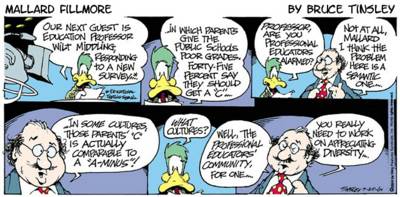
The cartoon says it all!
Survey : AMERICANS SEEK FAIRNESS IN PUBLIC SCHOOL FUNDING
Washington, D.C. (June 30, 2004) — A majority of
Americans recognize that there are significant differences
in the quality of schools in high- and low-income areas,
and they worry about an over-reliance on property taxes
as a way to fund schools, according to a national survey
released by Educational Testing Service (ETS).
These are among the findings of "Equity and Adequacy:
Americans Speak on Public School Funding," a public
opinion poll conducted by Democratic pollster Peter Hart
and the late Republican pollster Robert Teeter. This
fourth annual poll commissioned by ETS reveals
Americans’ attitudes about the fairness of the way in
which public schools are funded; education reform; and
how effectively the nation’s public schools are educating
students. During May and June, researchers surveyed
adults in general, parents of school children, and
education policy-makers as well as residents of electoral
battleground states.
According to the poll, nearly half (45%) of Americans
feel that schools need either major changes (30%) or a
complete overhaul (15%) to get on track. Parents give
their children’s school grades that average out to a B-,
and the average grade for the nation’s schools as a whole
is a C. The real concern is about schools in poor
neighborhoods, with 60 percent of the public saying that
schools in low-income areas are either inadequate or in
crisis.
Other important findings from the survey include:
• School assessments are unchanged - Parents give fairly
good grades to their neighborhood schools, but most
Americans see schools in low-income areas as inadequate.
• The public is split over NCLB - Real progress in
informing Americans has brought awareness of reforms to
half, compared with 37 percent a year earlier, but as many
are critical of reforms as welcome them.
• Accountability is in the eye of the beholder - While there
is great demand for education accountability, the public is
divided on how it defines accountability.
• Americans want fairness in school funding - They lean
toward a greater role for states in funding education as a
way to solve the problem in low-income schools.
Sixty-five percent of all adults say they believe it is
appropriate to allocate tax revenues raised in other areas
to schools in low-income areas. Policy-makers support
this by 68 percent.
• Americans are conflicted about how best to ensure
fairness in school funding - Policy differences are driven
by conflicting desires within and among individuals not
between groups (e.g., parents vs. nonparents). Majorities
want greater spending and lower taxes.
• The public may be willing to pay more for public
education - But only if they gain confidence that the
money will be targeted to unmet needs, and it will not be
wasted.
• Perceived waste limits support for tax hikes - As with
other areas of government spending, the public's view that
many education dollars are wasted lead many Americans
to challenge any tax increase proposals.
"Until America stops tying school funding so closely to
local wealth, fair and equitable funding for real school
reform will only be a dream," says ETS President and
CEO Kurt Landgraf. "This survey shows that parents and
policy-makers get it – education and fairness are
fundamental American values. We have to make sure the
way we fund our public schools reflects those values."
Download "Equity and Adequacy: Americans Speak on Public School Funding"

